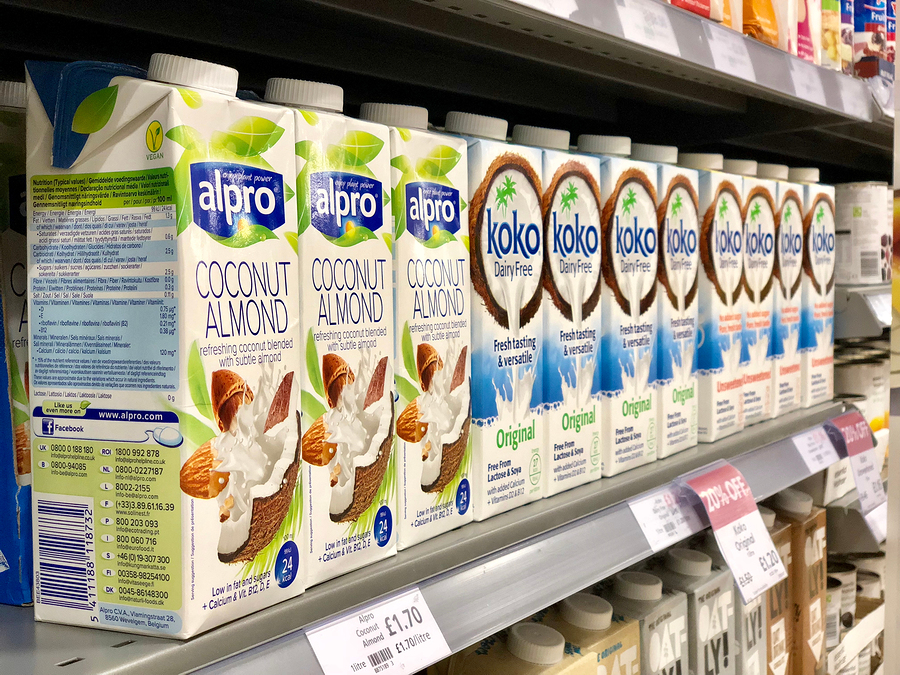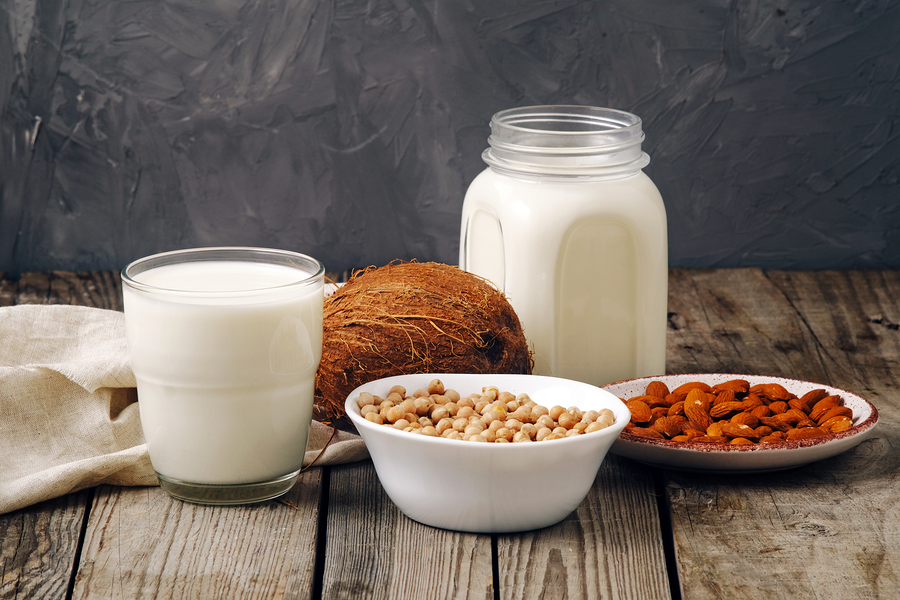Ditching cows’ milk? What’s the alternative?
The trend toward alternatives to cows’ milk seems unstoppable with almost a quarter of us Brits having already made the switch. But what are the differences between the ever growing variety of alternatives?
With sales of alternative milks increasing by 10% over the past two years, supermarkets are offering a seemingly endless choice but this can lead to confusion over which is best for the average consumer’s health and nutritional needs. Let’s face it – even going into the average coffee shop these days is leaving some of us flummoxed faced with choices such as an oat milk cappuccino or a coconut and vanilla latte!
Many reasons to switch
There are many reasons to ditch cows’ milk for a plant based alternative. For some it’s medical, such as being lactose intolerant, for others it could be ethical or even simply a matter of taste, but whatever your motivation it’s important to find an alternative that suits you nutritionally as there are huge variations in some of even the more common dairy free milk alternatives.
Anthony Glock, physiologist at AXA PPP healthcare, takes a look at the nutritional values of soya, almond, coconut, oat, rice and hemp as some of the most common dairy free milk alternatives and guides us through the key aspects to consider.
How much protein?
“Protein is an important component of our diets and essential for muscle repair and growth and keeping our bones strong, especially as we age”, says Anthony.
Coconut, hemp, rice, oat and almond milk contain the least protein with a maximum of 1g per serving. Compare this with cows’ milk which has around 8g per serving and soya with around 7g per serving.
In addition, it’s worth considering that cows’ milk contains a good amount of leucine. Leucine is an amino acid which triggers the essential process of protein synthesis within the body. Soya has very little leucine.
“On balance, soya milk is a good alternative to cows’ milk if you are concerned about keeping your protein content”, says Anthony.
There are many other ways to ensure you are getting your necessary protein intake – take a look at some of our vegetarian recipes such as our autumn vegetarian chilli.
How much sugar?
Unsweetened versions of the non-dairy alternatives, on the whole, are much lower in sugar than cows’ milk. However, watch out, as when sweetened and flavoured they can contain as much as 20g of sugar per serving which is approximately 80 calories from sugar alone.
Rice milk is the most comparable to cows’ milk in terms of sugar content, but again that is before it is sweetened or flavoured.
“The more sugar that is added and present in our diets, the increased risk we have of developing type 2 diabetes”, Anthony points out.
“So, stick with the unsweetened versions of whichever you decide to choose – especially avoiding the ones where sugar is listed in the first few ingredients – and sweeten up your food in other, nutritionally more beneficial ways, such as adding fruit to your porridge!”
How much fat?
Cows’ milk, full fat – contains 9g of fat per serving
Cows’ milk, skimmed – contains 1g of fat per serving
Soya milk – contains 4g of fat per serving
Other milk alternatives (unsweetened varieties) – around 1g of fat per serving
A bonus for soya is that it also contains Omega-3 which is unsaturated fat and required for keeping our hearts healthy.
Bear in mind that while the other milk varieties are similar to the 1% cows’ milk, they are higher in fat when sweetened and flavoured. This contributes to an increase in the calorie content of the milk.
Cows’ milk and coconut milk are also higher in saturated fats than most alternatives. Coconut is sometimes higher still so it is vitally important to check the food labels on coconut milk to see if that particular brand is high in saturates. Saturated fats are the fats to avoid as they have the potential to have a negative effect on our cholesterol and may lead to an increased risk of cardiovascular disease.
To find out more about the different types of fats and what they mean as well as some quick and easy tips, take a look at our article on different types of fats.
How many calories?
Full fat cows’ milk contains around 64 calories per 100ml. Many of the milk alternatives are lower in calories than cows’ milk but they do vary considerably, especially if the drink is unsweetened or sweetened – the higher the sugar, the higher the calories.
Almond milk (unsweetened) is one of the lowest calorie milk substitutes at around 13 calories per 100ml.
But of course, taste will be the biggest factor in which alternative you choose – if you can’t stand the taste then it won’t matter how few calories it contains!
What about calcium content?
Calcium is extremely important for our bodies, it keeps our bones and teeth strong and cows’ milk is brimming with it – around 30% of our daily requirement per serving in fact!
But Anthony explains how we don’t have to compromise on calcium even if we decide to ditch the cows’ milk.
“Although cows’ milk alternatives generally only contain 0.5-5% of the daily recommended amount of calcium, when opting for alternatives the key is to choose ones fortified with calcium as they then have a comparable amount of calcium to cows’ milk”.
Fortification is the process of adding essential vitamins and minerals to foods to ensure that our bodies would be receiving the recommended daily intake.
Are there fewer vitamins?
Although cows’ milk contains naturally occurring vitamins such as vitamin A, D and B12, fortified non-dairy alternatives have a similar number.
This means that fortified soya, rice, oat, coconut or almond milk will still provide our bodies with the essential nutrients it needs.
In fact, soya and almond milk have even greater amounts of vitamin E – essential for healthy skin and eyes and important in warding off illnesses and infections.
What about the cost?
Although non-dairy alternatives are often more expensive than cows’ milk the majority have long-life versions so enabling you to buy in bulk.
Alongside long-life versions, many supermarkets are now doing their own brand ranges of the more popular varieties such as soya, almond and coconut.

As with anything, it pays to shop around to keep the costs down and may be a factor when deciding on which alternative to choose.
Do I have to compromise on taste?
The alternatives to cows’ milk all have differing flavours so it’s just a matter of finding one to your taste.
Some of the flavours are quite distinct and so will give an extra dimension to your baking or smoothie making which is an added bonus!
So if you find several of the alternatives meet your health and wellbeing needs, you may need to try a variety to see which one you like best. You may even find something you prefer to have on your cereal or mid-morning coffee!
Other considerations
Finlay Haswell, fellow physiologist at AXA PPP healthcare, asks us to consider some other key things when choosing a dairy free alternative.
- Soya milk’s nutritional makeup is a close non-dairy substitute for cows’ milk, as it contains similar amounts of protein (although has around half the number of calories, fats and carbohydrates).
- If you are diabetic or pre-diabetic, “it’s recommended that you avoid rice milk, as it has a high glycemic index (GI), meaning that it’s quickly absorbed and rapidly raises blood sugar levels.”
- If you limit your animal produce intake or avoid it entirely, try opting for milk fortified with Vitamin B12, which is essential for a healthy brain and immune system. Vitamin B12 is mainly found in animal products, so if you’re excluding these from your diet, be sure to find other ways to get your B12!
Also, Finlay warns that if you’re substituting cows’ milk for non-dairy in tea and coffee some of the alternatives are at risk of curdling in the hotter liquid or they just don’t mix so well.
Much to consider
We hope we have covered the key points to consider when switching from cows’ milk to dairy free alternatives – there do seem rather a lot but with the right research and testing and with a little perseverance you will find the best alternative for you and your wellbeing – whatever your reason for wanting to change!
Disclaimer
All content on Silversurfers.com is provided for general information only, and should not be treated at all as a substitute for the medical advice of your own doctor or any other health care professional. Silversurfers will not be responsible or liable for any diagnosis made by a user based on the content on www.silversurfers.com and we are also not liable for the content of any external websites or links from or to Silversurfers to any other websites. Please always consult your own doctor if you’re in any way concerned about any aspect of your health.
Melina - Assistant Editor
Latest posts by Melina - Assistant Editor (see all)
- Banana bread with SunGold kiwis - February 20, 2025
- A tribute to Bob Marley - February 4, 2025
- Going to Work on an Egg! - January 29, 2025
- The Very Best of Petula Clark - January 14, 2025
- 50 Years of Coat Trends - January 12, 2025




















